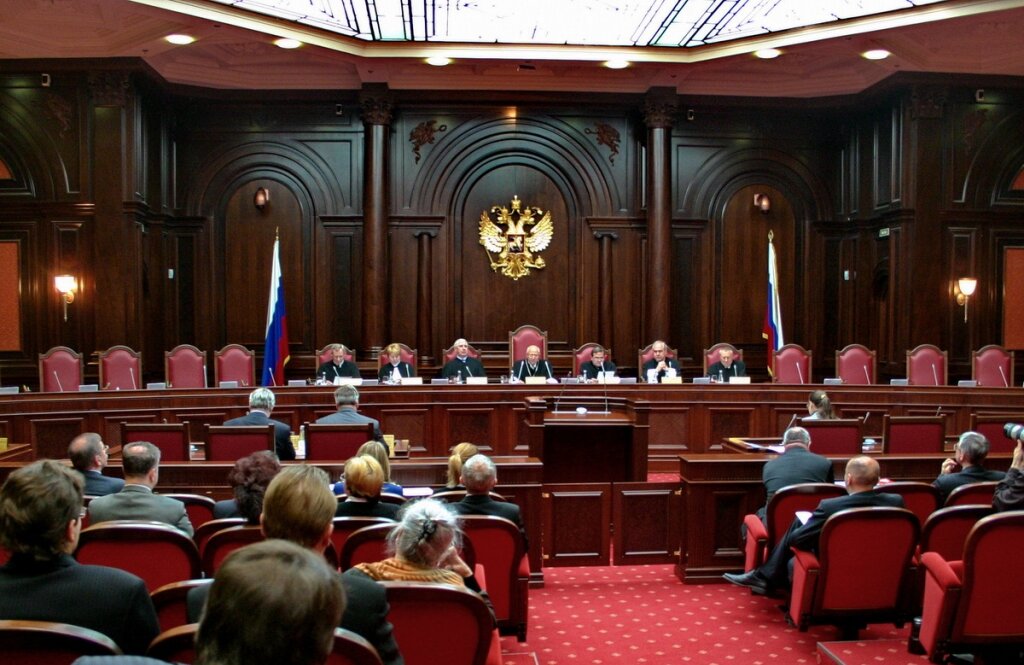Thomas Callahan is a Crowley Scholar of International Human Rights Law at Fordham Law, and the Executive Notes and Articles Editor of the Fordham International Law Journal.
Last Monday, Russian President Vladimir V. Putin signed a law that will allow the Russian Constitutional Court to review the rulings of international human rights courts. It's true that the law is part of a legislative offensive meant to combat foreign influence in Russia's domestic affairs that has been underway for a few years. But given Russia's historical treatment of international human rights norms compared to other world powers, the insidiousness of this particular law is probably more apparent than real.
The law cruised through Russia's legislature, passing at the State Duma (the lower house) on Friday December 4, and then at the Federation Council (the upper house) on Wednesday, December 9, indicating approval from Putin's majority United Russia Party. The law is said to follow an end-of-2014 ruling at the European Court of Human Rights ordering Russia to pay nearly EUR 1.9 billion to the former shareholders of Yukos, oligarch Mikhail Khodorkovsky's oil company that, you may recall, was broken up and distributed in pieces to state-owned utilities from 2003 to 2007.
It's tough to overstate just how uncharacteristic the ruling is for the European Court, which typically awards Russians four-figure euro sums, if anything, on civil rights claims. Yukos' shareholders had already been awarded $50 billion in an arbitration proceeding last year on similar claims, and the European Court actually has procedural rules against hearing cases that have been or are being considered at other tribunals. But that's probably neither here nor there.
When Putin signed this law, the hyperbolic headlines and apparent ignorance of the Russian legal system, not to mention of international law were ... not unexpected.
Huffington Post's headline read, Vladimir Putin Signs Law Allowing Russia To Overthrow Human Rights Court Verdicts. Let's just get it out of the way that you cannot ‟overthrow” a verdict. Such headlines, while kind of accurate, are misleading for a number of reasons, not least that as President of Russia, Vladimir Putin signs all laws. It's not like he wrote it, as if that would be necessary to prove his Badness, or something.
To illustrate the variance of positions on international human rights law, I always find it worth mentioning that the United States is unique in the world in that it has not subjected itself to the jurisdiction of any international human rights court. Russia, meanwhile, accepts the jurisdictions of two, and Russians litigate often – and win – at both on a variety of civil rights and other claims. In addition to the European Court, Russians can sue their government for human rights violations at the United Nations Human Rights Committee, which does not award money damages but will basically nag a government publicly for years on end in the hope that it will stop using violative laws and law enforcement practices. This new law does not threaten to give Russia blanket immunity from either.
What Does the Law Say?
I found and read it so you don't have to. It increases the Russian government's legislative and juridical sovereignty in some important ways.
To give some context, coverage in Rossiiskaya Gazeta, the (yes, state-operated) paper of record for Russia's legislative developments, was more levelheaded: one example headline reads, Rulings of the Constitutional Court of the Russian Federation Receive Primacy over European Court of Human Rights Decisions, while the subheadline of the official press release reads, ‟The Constitutional Court will adjust European Court decisions pursuant to the Russian Constitution.” And to give further context, Russia's Constitutional Court exists solely to hear controversies over whether Russian laws comply with the Russian Constitution. It is not a court of appeals.
This law does two things. First, it allows the Constitutional Court to review an international court's ruling where someone from the executive (read VVP) or an executive agency asserts that implementing the ruling would violate the Russian Constitution. Secondly, it gives the Constitutional Court two options when reviewing an international court's decision: either let it stand, or declare it ‟impossible to perform.” The rest is procedural stuff.
It's important to note that this law actually says that Russia's established understandings and implementations of international legal norms should be part of the Constitutional Court's review proceedings. And, as far as I can tell from the law, only international court rulings specifically referred to the Constitutional Court will be reviewed.
Really, this law asserts that if the ruling of an international tribunal is found to violate the Russian Constitution, Russia reserves the right to modify it in order to comply with domestic law. Not so crazy, right? And after all, the Russian Constitution is pretty good, all other things being equal: it bars discrimination on all the grounds you'd expect – race, gender, religion – plus class, protects the right to privacy and the freedom of expression and association, and so on. Some articles of the Russian Constitution actually give stronger human rights protections than the European Convention on Human Rights, the treaty on which the European Court bases its decisions. Implementation, of course, is a different question beyond the scope of this post.
International Law: How Does it Work?
Speaking broadly, governments can be considered either ‟monist” or ‟dualist” when it comes to international law. In the ‟monist” conception – the Netherlands is one example of a monist jurisdiction – a country's international legal obligations are automatically woven into its domestic legal fabric. In the ‟dualist” conception – the United States is the archetypal dualist jurisdiction – the country's international legal obligations are seen as totally separate from, and therefore presumed to not apply to, domestic law unless the country's legislature passes implementing legislation.
Surprise, surprise: Russia does not fit neatly into either of these models.
Article 15 of the Russian Constitution states that Russia's international treaty obligations, as well as ‟internationally recognized norms” (the ban on torture would be one example) are to be an ‟integral part” of Russia's legal system. In fact, the Constitution requires that international legal obligations get precedence when conflicting with domestic law. The European Convention on Human Rights creates some of these obligations. Though Russia's Constitution is amended often by American standards, this new law does not amend the Constitution – it modifies Russia's Law On the Constitutional Court, which is essentially a procedural statute. And Russia's considerations of international law do not stop with the Constitution.
The Supreme Court of the Russian Federation, Russia's final court of appeals, will occasionally convene as a plenum, issuing directives on how lower courts should treat various concepts in Russian law. For example, the Supreme Court Plenum's directive on defamation law states that restrictions to freedom of speech in order to protect an individual's reputation or honor ‟shall be construed in accordance with the legal position of the European Court of Human Rights, expressed in its decisions.” This is not an atypical position at the Russian Supreme Court.
The Russian court system is way more complicated than the US court system. For example, like many countries, Russia has multiple versions of what Americans would think of as a Supreme Court. So though the Supreme Court of the Russian Federation declares that international human rights law (and international law generally) is a fundamental part of the Russian legal system, and that lower courts must consider it in their rulings, the Constitutional Court now has the statutory right to allow noncompliance with specific international legal decisions where their implementation would otherwise violate Russian law. Does that make sense?
Is this Law Normal?
The basic answer is, ‟yes.” Does ‟normal” equal ‟good” in the legal context, or any other one, for that matter? That's up to you.
Consider the 2008 US Supreme Court case Medellín v. Texas, which sets the standard on how we incorporate international law. Mexican national José Ernesto Medellín confessed to the rape and murder of two girls in Texas, but Texas law enforcement failed to tell him he had the right, under an international treaty the United States has ratified, to notify the Mexican Consulate of his arrest. He was convicted and sentenced to execution. Mexico subsequently sued the United States at the International Court of Justice (ICJ) – the judicial branch of the United Nations, where countries sue each other – on a separate cause of action that the United States had violated that same treaty.
Mexico won the case, and Medellín raised the issue during the appeal of his own case. It went to the US Supreme Court, which ruled that while international treaties may constitute international commitments, they are not binding on the US in its own domestic law unless Congress either passes a law stating as much, or determines the treaty to be ‟self-executing.” Therefore, in the US, not only are international court decisions not binding domestically, but unless Congress or the Constitution authorize their implementation, neither are the rules of any international treaty.
So really, Russia is approaching the US model of recognition of international law. But Russia – at least in a legal-rhetorical vacuum – will remain more progressive than many other States on these questions by continuing to recognize the jurisdictions of multiple international human rights courts. Will Russia use this new law to strike down European Court decisions awarding public interest lawyers the equivalent of three grand after police raid their offices and steal a bunch of electronic equipment (not something I just made up off the top of my head)? It remains to be seen. But in the context of how countries consider and implement international law, this new Russian law gives us nothing to freak out about just yet. Hold off until we see how, and how often, it's used.



